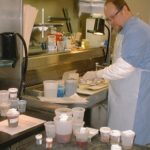
Forensic pathologists, or medical examiners, are specially trained physicians who examine the bodies of people who died suddenly, unexpectedly or violently.
The forensic pathologist is responsible for determining the cause (the ultimate and immediate reasons for the cessation of life) and manner of death (homicide, suicide, accidental, natural or unknown).
To determine the identity of the victim and the time, manner and cause of death, the forensic pathologist:
- Studies the medical history
- Evaluates crime scene evidence including witness statements
- Performs an autopsy to uncover evidence of injury or disease
- Collects medical and trace evidence from the body for further analysis
In addition to anatomy, the forensic pathologist may draw upon specialized knowledge and training in:
- Toxicology
- Firearms/ballistics
- Trace evidence
- Serology (blood analysis)
- DNA technology
They also ensure that procedures regarding evidence collection are followed, and coordinate their work with law enforcement operations.
A city, county or state may appoint a forensic pathologist to act as a medical examiner.
Clinical forensic pathologists examine living patients, usually in cases where sexual assault or abuse is suspected.
Once all the evidence is analyzed, the forensic pathologist prepares a written report and may also testify to these findings in court.
Becoming a forensic pathologist is not easy. It takes a minimum of 13 years of education and training after high school to become a forensic pathologist. It also takes a strong stomach because it can be a gruesome, smelly and disgusting job. And you need to have a lot of confidence in order to defend your conclusions in the face of opposition from lawyers, the media and even the victims’ families.
Working Conditions
Some forensic pathologists work for the city, county or federal government, while others work in hospitals, medical schools or with a private or group practice that contracts autopsy services to government agencies.
Forensic pathologists spend most of their time in the lab, performing autopsies or examining tissue samples under the microscope. This can involve standing for extended periods and working with small tools.
A typical workday can last 10 to 12 hours or longer, particularly if the forensic pathologist must examine a distant death site. Part of the workday also may include writing official reports and making court appearances.
The physical demands are not great, but over time, the forensic pathologist may become emotionally affected by continual exposure to graphic violence.
Academic Requirements
If you are interested in this field, you will need to be strong in all areas of science. Forensic pathology draws on biology, physics, chemistry, even psychology and anthropology. Communication skills are also important since half the job of being a forensic pathologist is writing reports and giving testimony.
A forensic pathologist must first earn a bachelor’s degree, then a medical degree, either an M.D. or D.O. Extensive additional education and training is required, including four to five years of training in anatomic, clinical and/or forensic pathology and a one-year residency or fellowship in forensic pathology.
Once training is completed, a forensic pathologist must pass an exam to become board certified.
Preparation Timeline
In High School
- Take advanced math, science and English courses.
- Develop strong writing skills.
- Practice public speaking in class and by joining the debate team.
In College
- Choose any undergraduate major, including a humanities degree, but make sure to take all the science and math courses required to get into medical school.
- If you are enrolling in a forensic science program, make sure the program is accredited and includes at least 24 semester hours of chemistry or biology and math, as well as all the prerequisites for medical school.
- Seek out experiences that expose you to different cultures and perspectives.
- Consider learning a foreign language.
In Medical School
- Focus on patient care.
- Do an autopsy pathology rotation as an elective to make sure this is the right specialty for you.
- Explore opportunities to work or do a rotation at the local medical examiner’s office.
Resources
- American Academy of Forensic Sciences
- American Society for Investigative Pathology
- National Association of Medical Examiners
- National Board of Medical Examiners
